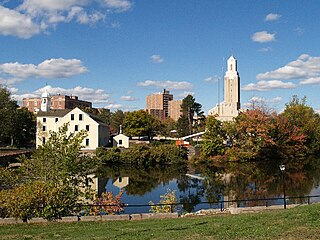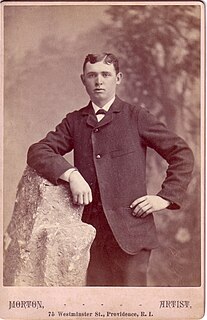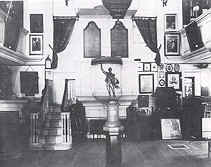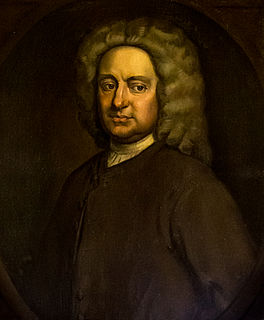The American-French Genealogical Society (AFGS) was established in 1978 as a genealogical and historical organization for French-Canadian research. It was founded by members of the Le Foyer Club in Pawtucket, Rhode Island, United States. Its headquarters are in nearby Woonsocket, Rhode Island. Its vast resources include more than 10,000 volumes of repertoires (marriage records), genealogies, biographies, histories, genealogical journals, and publications of regional, national, and international scope.

Pawtucket is a city in Providence County, Rhode Island, United States. The population was 71,148 at the 2010 census. It is the fourth largest city in the state.

Woonsocket is a city in Providence County, Rhode Island, United States. The population was 41,186 at the 2010 census, making it the sixth largest city in the state. Woonsocket lies directly south of the Massachusetts state line and constitutes part of both the Providence metropolitan area and the larger Greater Boston Combined Statistical Area.
The society publishes a quarterly journal, Je Me Souviens.

Newport is a seaside city on Aquidneck Island in Newport County, Rhode Island, located approximately 33 miles (53 km) southeast of Providence, Rhode Island, 20 miles (32 km) south of Fall River, Massachusetts, 73 miles (117 km) south of Boston, and 180 miles (290 km) northeast of New York City. It is known as a New England summer resort and is famous for its historic mansions and its rich sailing history. It was the location of the first U.S. Open tournaments in both tennis and golf, as well as every challenge to the America's Cup between 1930 and 1983. It is also the home of Salve Regina University and Naval Station Newport, which houses the United States Naval War College, the Naval Undersea Warfare Center, and an important Navy training center. It was a major 18th-century port city and also contains a high number of buildings from the Colonial era.

Rhode Island School of Design is a private art and design college in Providence, Rhode Island. The college’s immersive model of art and design education emphasizes robust liberal arts studies and conceptually driven studio-based learning in full-time bachelor's and master's degree programs across 19 majors. It has consistently been ranked among the best educational institutions in the world for art and design.
William Hutchinson (1586–1641) was a judge in the Colonial era settlement at Portsmouth on the island of Aquidneck. Aquidneck Island was known at the time as Rhode Island, and it later became part of the Colony of Rhode Island and Providence Plantations.

Thomas W. Bicknell was an American educator, historian, and author.

Arthur Wallace Steere (1865–1943) was a Rhode Island politician and prominent businessman and landowner.

The history of Rhode Island is an overview of the Colony of Rhode Island and Providence Plantations and the state of Rhode Island from pre-colonial times to the present.

Aram Jules Pothier was an American banker and politician of French Canadian descent. He served as the 51st and 55th Governor of Rhode Island.

Henry Jonah Steere (1830–1889) was a prominent American philanthropist and industrialist from Rhode Island.

The Rhode Island Historical Society is a privately endowed membership organization, founded in 1822, dedicated to collecting, preserving, and sharing the history of Rhode Island. Its offices are located in Providence, Rhode Island.
Nicholas Easton (c.1593–1675) was an early colonial President and Governor of Rhode Island. Born in Hampshire, England, he lived in the towns of Lymington and Romsey before immigrating to New England with his two sons in 1634. Once in the New World, he lived in the Massachusetts Bay Colony towns of Ipswich, Newbury, and Hampton. Easton supported the dissident ministers John Wheelwright and Anne Hutchinson during the Antinomian Controversy, and was disarmed in 1637, and then banished from the Massachusetts colony the following year. Along with many other Hutchinson supporters, he settled in Portsmouth on Aquidneck Island, later a part of the Colony of Rhode Island and Providence Plantations. He was in Portsmouth for about a year when he and eight others signed an agreement to create a plantation elsewhere on the island, establishing the town of Newport.

The Newport Historical Society is a historical society in Newport, Rhode Island that was chartered in 1854 to collect and preserve books, manuscripts, and objects pertaining to Newport's history.
John Easton (1624–1705) was a political leader in the Colony of Rhode Island and Providence Plantations, devoting decades to public service before eventually becoming governor of the colony. Born in Hampshire, England, he sailed to New England with his widowed father and older brother, settling in Ipswich and Newbury in the Massachusetts Bay Colony. As a supporter of the dissident ministers John Wheelwright and Anne Hutchinson during the Antinomian Controversy, his father was exiled, and settled in Portsmouth on Aquidneck Island with many other Hutchinson supporters. Here there was discord among the leaders of the settlement, and his father followed William Coddington to the south end of the island where they established the town of Newport. The younger Easton remained in Newport the remainder of his life, where he became involved in civil affairs before the age of 30.

John Wanton was a governor of the Colony of Rhode Island and Providence Plantations, serving for six consecutive terms from 1734 to 1740. He was the son of Edward Wanton who was a ship builder, and who became a Quaker after witnessing the persecution of these people, also becoming a preacher of that religion. Edward Wanton had lived in York, Maine; Boston, Massachusetts; and Scituate, Massachusetts before coming to Rhode Island.

William Greene Sr. was a governor of the Colony of Rhode Island and Providence Plantations. He was a clerk of the county court in Providence, deputy from Warwick, speaker of the Rhode Island Assembly, and then deputy governor from 1740 to 1743. He became governor for the first time in 1743 and served four separate terms for a total of 11 years, and died while in office during his final term.
Elisha Brown was a deputy governor of the Colony of Rhode Island and Providence Plantations. He was the son of James and Mary (Harris) Brown, and the great grandson of early Rhode Island settler and Baptist minister Chad Brown. Brown was a member of the General Assembly, and possessed a large property, which was lost during the financial difficulties of the mid-18th century. During the Ward-Hopkins controversy, he sided with Samuel Ward, and during Ward's term as governor from 1765 to 1767, Brown was selected as his deputy governor.
Maureen Alice Taylor, born April 14, 1956, is a genealogist, author, and speaker in Providence, Rhode Island with expertise in genealogy, art history, costume history and cultural anthropology. She is a blogger, and author of many books and magazine articles. The Wall Street Journal named her the "nation's foremost historical photo detective."
Gideon Cornell (1710–1766) was a farmer, trader and judge who became the first Chief Justice of the Rhode Island Supreme Court, serving from 1747 to 1749.
Frederic Poole Gorham was an American bacteriologist and educator.
George Andrews Moriarty Jr. (1883–1968), called G. Andrews Moriarty in most of his published work, was an American genealogist from Newport, Rhode Island. He was born in Newport on February 14, 1883, the only son of George Andrews Moriarty and Mary Ann Sheffield. His ancestor, John Moriarty, emigrated from Ireland in 1777 and settled in Salem, Massachusetts. George attended St. George's School in Newport, and then did his undergraduate work at Harvard University where he earned an A.B. in 1905, cum laude. He then attended Christ Church College in Oxford, England where he specialized in historical studies, following which he returned to Harvard to earn an M.A. in 1907.











